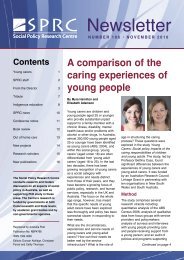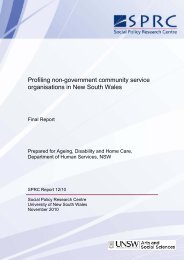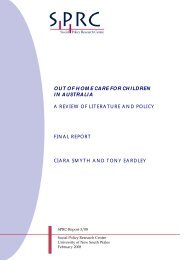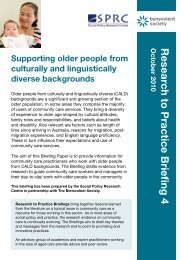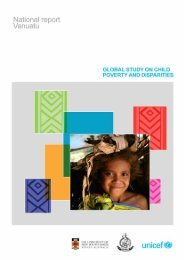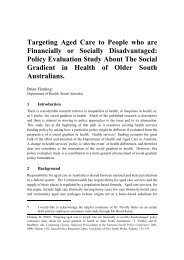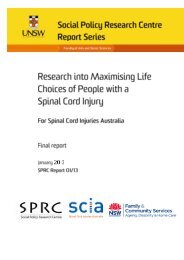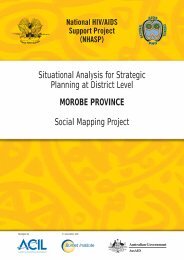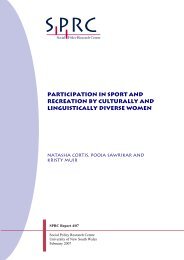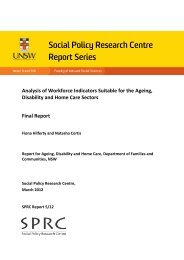A Strategic Assessment of the Children's Services Industry
A Strategic Assessment of the Children's Services Industry
A Strategic Assessment of the Children's Services Industry
- No tags were found...
Create successful ePaper yourself
Turn your PDF publications into a flip-book with our unique Google optimized e-Paper software.
STRATEGIC ASSESSMENT OF THE CHILDREN’S SERVICES INDUSTRYIn 2005, <strong>the</strong> UN Committee on <strong>the</strong> Rights <strong>of</strong> <strong>the</strong> Child released General Comment No. 7:Implementing child rights in early childhood (United Nations, 2005). Concerned with <strong>the</strong>development <strong>of</strong> a ‘positive agenda for rights in early childhood’ this paper is especiallypertinent to a discussion <strong>of</strong> ECEC policy. The rights <strong>of</strong> infants and very young children have,in many cases, been interpreted as being primarily concerned with issues such as health andsurvival. The broader principles <strong>of</strong> <strong>the</strong> Convention, in relation to areas such as participation indecision-making and education, have more usually been applied to older children. TheGeneral Comment advocates <strong>the</strong> recognition <strong>of</strong> young children as rights holders and personsin <strong>the</strong>ir own right, ‘active members <strong>of</strong> <strong>the</strong>ir families, communities and societies’ ra<strong>the</strong>r than‘people in <strong>the</strong> making’, waiting to be moulded by adults. It stresses <strong>the</strong> applicability to youngchildren <strong>of</strong> rights-related principles such as participation, respect for <strong>the</strong>ir ‘concerns, interestsand points <strong>of</strong> view’, as well as attention to <strong>the</strong>ir particular requirements for ‘physicalnurturance, emotional care and sensitive guidance.....social play, exploration and learning’(UN 2005).Thus <strong>the</strong> UNCROC is significant to ECEC in multiple ways. It advocates <strong>the</strong> provision <strong>of</strong>early childhood services; it asserts that such services should always operate in children’s bestinterests; and it promotes respect for children’s agency through <strong>the</strong> work and purposes <strong>of</strong> <strong>the</strong>early childhood setting. The extent to which each country has actively drawn upon <strong>the</strong>Convention to inform policy and practice in early childhood education and care varies.Sweden boasts a ‘highly developed view <strong>of</strong> <strong>the</strong> child based on democratic values which givesrespect for <strong>the</strong> child as a person in its own right and a belief in <strong>the</strong> child's inherent skills andpotential’ (Korpi, 2000). New Zealand has drawn extensively on <strong>the</strong> Convention to informpolicy developments in early childhood education, particularly its strategic plan for earlychildhood education (Smith, 2007).The degree to which children’s rights principles are embedded in government policies appearsto be related to how much formal recognition is institutionalised through <strong>the</strong> creation <strong>of</strong>ministries for children. For instance, one suggestion <strong>of</strong> <strong>the</strong> OECD Country Note for <strong>the</strong> UKwas <strong>the</strong> creation <strong>of</strong> an Ombudsman for Children to work across relevant ministries to ensurethat children’s issues were addressed systematically (OECD, 2000). Sweden established <strong>the</strong>Office <strong>of</strong> <strong>the</strong> <strong>Children's</strong> Ombudsman in 1993. A decade later, New Zealand created aCommissioner for Children and Nor<strong>the</strong>rn Ireland established a Commissioner for Childrenand Young People. In 2004, Scotland established a <strong>Children's</strong> Commissioner; and in 2005,England's first <strong>Children's</strong> Commissioner was appointed. Nei<strong>the</strong>r Australia nor Canada has yetestablished national children’s ministries; although in Australia equivalent Commissions existin a number <strong>of</strong> States and Territories. The Australian government introduced legislation for aChildren’s Commission at <strong>the</strong> national level in 1974 but <strong>the</strong> Commission was neverestablished (Brennan, 1994).The OECD Policy Considerations for ECECA systemic and integrated approach to policy development and implementationThe shape <strong>of</strong> children’s early care and education has been influenced by a range <strong>of</strong> policyarenas and imperatives. The organisation <strong>of</strong> ECEC reflects changes to family and workforcestructures, research on children’s development and wellbeing, and <strong>the</strong> impact <strong>of</strong> broader shiftsin economic policy on <strong>the</strong> provision <strong>of</strong> services once considered <strong>the</strong> province <strong>of</strong> governmentor <strong>the</strong> public sector, or indeed, <strong>the</strong> family itself. The provision <strong>of</strong> child care and preschoolservices has been linked to strategies to: enable women’s participation in <strong>the</strong> paid labormarket and, by association, enable women’s citizenship (Dobrowolski and Jenson, 2004);redress disadvantage, particularly educational disadvantage and poverty; reinvigoratecommunities; and, more recently, has been linked to an enactment <strong>of</strong> children's rights.14



